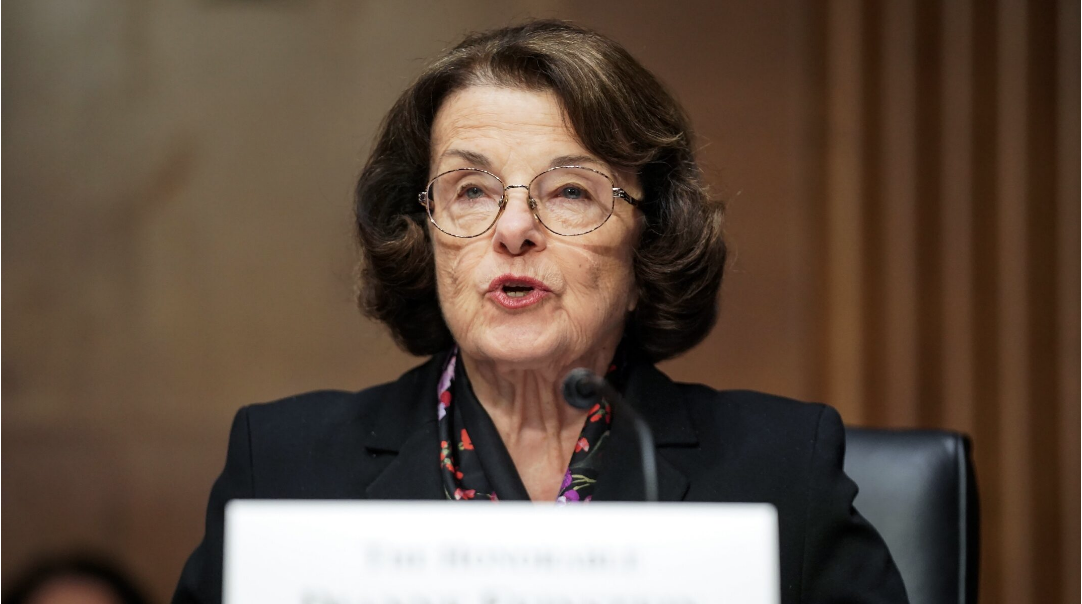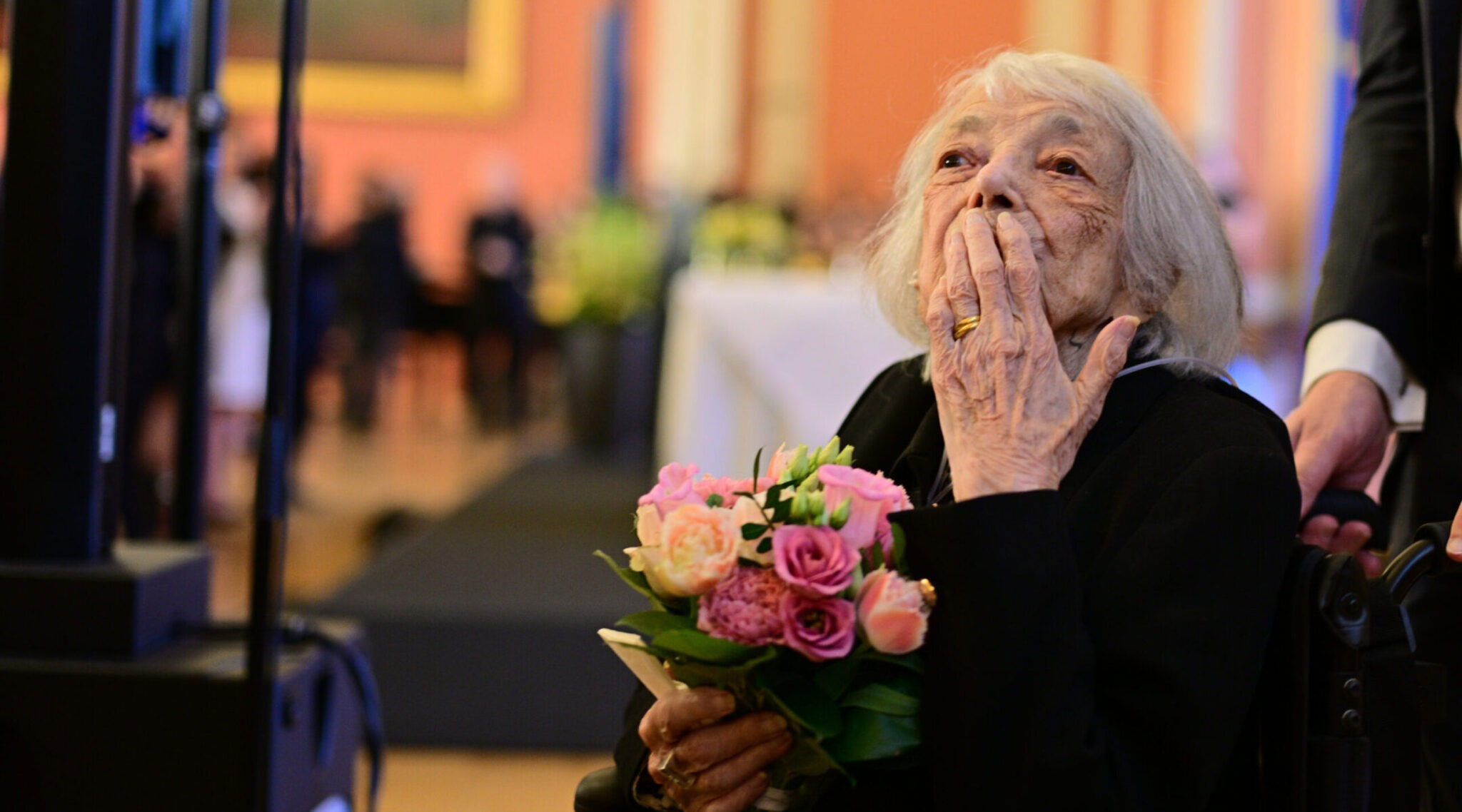(JTA) — Dianne Feinstein, the long-serving Jewish senator from California who rose to national prominence when she appeared before cameras with her hands stained with the blood of a murdered colleague, has died.
Feinstein, who had recently faced criticism for remaining in the Senate despite clearly failing health, was 90 years old. She died Thursday night, major news organizations are reporting.
Feinstein had served in the Senate for more than three decades as its longest-serving woman. President Joe Biden ordered flags at half staff at the White House and at government and military properties on the day of her burial.
Feinstein became a national figure in 1978 when she was the president of the Board of Supervisors in San Francisco and found the body of fellow supervisor Harvey Milk.
Milk, who was Jewish, was the first openly gay elected official in the city’s history and was assassinated by a former colleague, Dan White. White also killed San Francisco Mayor George Moscone.
Feinstein announced the murders while her hands were still stained with Milk’s blood. She soon stepped in to replace Moscone, serving two terms as mayor.
“I remember it, actually, as if it was yesterday,” she recalled in 2008. “And it was one of the hardest moments, if not the hardest moment, of my life. It was a devastating moment. For San Francisco, it was a day of infamy.”
Feinstein’s father was a Jewish physician and her mother was a model who was born to an ethnically Jewish family but raised in the Russian Orthodox church. Feinstein was born on June 22, 1933, in San Francisco, attended a Roman Catholic school and said, when she was running for governor in 1990, that her parents left it up to her to decide which faith suited her.
When she was 20, she picked Judaism, she said, “because I liked its simplicity and directness.” She was twice widowed and once divorced; all three of her husbands were Jewish.
The trauma of the double murder propelled her to become an outspoken advocate for gun control, a cause she took with her into the Senate, when she won a special election in 1992 to replace Sen. Pete Wilson, a Republican who had defeated Feinstein in the 1990 election for governor.
That election cycle became known as the Year of the Woman. Feinstein and three other newly elected women senators tripled the number of women in the Senate from two to six. One was Barbara Boxer, who, like Feinstein, was a Jewish Democrat from California.
Record numbers of women ran for office, spurred in part by the humiliating treatment Anita Hill got in the Senate the year previous when she testified about the sexual harassment she allegedly endured while employed with Clarence Thomas, a Supreme Court nominee.
Hill’s treatment helped galvanize Feinstein’s decision to run for the Senate. During the 2018 hearings for another Supreme Court nominee accused of sexual wrongdoing, Brett Kavanaugh, Feinstein recalled coming across a crowd of people watching the Thomas hearings at a TV in an airport in 1991, a year before her election.
Feinstein stood apart from her liberal cohort in some respects. Her best known split with liberals was her championing the death penalty until 2018, when she said during her campaign for reelection that its unfair application had finally changed her mind.
Her enthusiasm for law and order was triggered when a far left group, the New World Liberation Front, detonated a bomb planted in a flower box outside her home in 1976, when she was a member of the San Francisco Board of Supervisors, part of a terrorist campaign targeting city leaders.
In 2004, she feuded with Kamala Harris, then the San Francisco District Attorney and now the vice president, when she learned at the funeral of a slain police officer that Harris opposed the death penalty for his killer. Feinstein said then she would not have endorsed Harris for the district attorney job had she known of her opposition to the death penalty. (The feud didn’t last; Feinstein and Boxer endorsed Harris in her 2016 Senate run to replace Boxer, key nods that helped propel Harris to victory.)
Feinstein was for years a centrist on Israel, allied with the American Israel Public Affairs Committee, although she was a sharp critic of the country’s treatment of non-Orthodox Jews. In 1986, as mayor, she expanded commercial ties with San Francisco’s sister city, Haifa. It was her revulsion with deadly weapons that nudged her toward questioning Israel: She was appalled at Israel’s use of cluster bombs in its 2006 war with Hezbollah in Lebanon.
“What gives rise, in part, to my bill are recent developments in Lebanon over alleged use of cluster bombs by Israel,” she said in 2007, introducing legislation to restrict the sale of the weapons.
Remarkably, Feinstein chose to promote her proposed cluster bomb ban that year at the Arab American Institute, an organization frequently at odds with the mainstream pro-Israel community. “We will get this job done,” she said at the time to applause.
Within a few years she was departing from pro-Israel orthodoxy in other areas: She opposed proposed Iran sanctions in 2014 because she feared the underlying legislation would draw the United States into a war on Israel’s behalf.
“Let me acknowledge Israel’s real, well-founded concerns that a nuclear-armed Iran would threaten its very existence,” she said then on the Senate floor. “While I recognize and share Israel’s concern, we cannot let Israel determine when and where the U.S. goes to war.”
More recently, she championed renewed aid to the Palestinians, slashed to almost nothing by Trump and Republicans in Congress hostile to a Palestinian leadership they depict as bloodthirsty.
“Denying funding for clean water, health care and schools in the West Bank and Gaza won’t make us safer,” she said in 2019. “Instead it only emboldens extremist groups like Hamas and pushes peace further out of reach.”
Feinstein, who was the top Democrat on the Senate Intelligence Committee from 2009 to 2017, also differed from her colleagues — particularly Ron Wyden, the Jewish Democrat from Oregon — in defending the intelligence community even after a welter of leaks toward the end of the 2000s revealed its abuses.
She defended the intelligence agencies’ collection of American citizens’ metadata, the wealth of information that can track where a person is with whom they communicate and for how long, among other details. “It’s called protecting America,” Feinstein said in 2013, claiming the practice was routine.
As her party moved left, however, so did she; In 2014, as committee chairwoman, Feinstein declassified a report on the CIA’s use of torture after the Sept. 11, 2001 attacks, over the objections of President Barack Obama. In 2017, she said her decision in 2002 to be one of 29 Senate Democrats to authorize the Iraq War would haunt her, in part because she bought into the false claims the intelligence community was peddling.
“It is the decision I regret most and I have to live with it,” she told author Gail Sheehy.
One factor nudging her to the left was the election in 2016 of Donald Trump as president. Her deep experience in matters of intelligence helped spur her outrage with the new president as she uncovered evidence ahead of the election that Russia was interfering.
“Based on briefings we have received, we have concluded that the Russian intelligence agencies are making a serious and concerted effort to influence the U.S. election,” she and Adam Schiff, a House California Jewish Democrat who is now running to replace her in the Senate, said in a headline-making statement just weeks before election day.
“At the least, this effort is intended to sow doubt about the security of our election and may well be intended to influence the outcomes of the election,” the statement said. “We can see no other rationale for the behavior of the Russians.”
In 2020, as the top Democrat on the Judiciary Committee, Feinstein drew outrage from fellow Democrats for her friendly questioning of Amy Coney Barrett, the Supreme Court nominee Republicans rushed through to replace Ruth Bader Ginsburg, the liberal Jewish icon who had died just before an election that returned Democrats to the Senate majority. It didn’t help that she hugged the committee chairman, South Carolina Republican Lindsey Graham, after the hearing.
That along with signs that Feinstein’s mental acuity was diminishing led her to step down as the top Democrat on the key committee. Reporting described her as engaged during meetings and telephone calls, and then, hours and even minutes later, not remembering the exchanges. In early 2023, she announced that she would not run again for election in 2024.
Feinstein is survived by her daughter, Katherine Anne Feinstein, a former judge, and a granddaughter.
Dianne Feinstein, long-serving Jewish senator from California, dies at 90

Courtesy of JTA. Photo credit: Greg Nash-Pool/Getty Images
Sen. Dianne Feinstein, a California Democrat, introduces Xavier Becerra, nominee for Secretary of Health and Human Services, during his Senate Finance Committee nomination, Feb. 24, 2021




